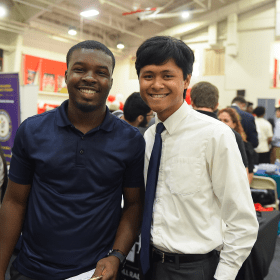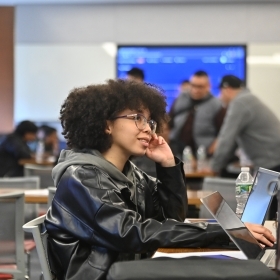Making an Impact through Social Entrepreneurship: UN Leader Insights

Are you ready to create a positive impact through social entrepreneurship? In this video, Gina Lucarelli, leader of the United Nations Development Programme (UNDP) Accelerator Labs, the world’s largest learning network, explains how social innovation, sustainable development, and global collaboration can tackle pressing challenges and ignite positive change. Whether you look to launch a startup or scale your impact, this conversation equips you with the tools and motivation to make a real-world difference.
About the Speaker
Ms. Lucarelli is a leader with a strong vision for positive change on a global scale. She has more than 20 years of experience in human rights and development work. As the head of the team behind the Accelerator Labs, she is passionate about creating impactful solutions. Ms. Lucarelli uses her expertise as a systems thinker, designer, and problem solver to lead and foster experimentation in tackling complex development challenges and uncovering new opportunities.
Her exceptional contributions have earned her numerous recognitions, including being named one of Apolitical’s 2019 Global Public Service Teams of the Year. Her impactful work has been featured in prestigious publications such as the MIT Sloan Management Review and a Harvard Business School Case Study.
In this inspiring video question-and-answer session, Ms. Lucarelli shares
Her motivation for joining the United Nations (UN).
The UNDP Accelerator Labs’ mission.
Entrepreneurial opportunities for social impact.
The future of innovation in business.
The shared values at St. John’s Venture & Innovation Center (VIC) and the Accelerator Lab Network.
Advice for entrepreneurs
Read the summarized version of the video Q&A below.
What inspired you to get involved with the United Nations?
I genuinely believe in the first three words of the UN charter: “We, the people.” Sometimes, when you look at the world, it’s easy to see all the environmental damage, accelerating inequalities, violence, and extremism and think it’s a desperate place. But I always believe that if we are smart enough to get ourselves into this mess, we are smart enough to get ourselves out of it.
Thinking about distributed intelligence, considering what eight billion people worldwide know, think, and have ideas for, brings incredible possibilities. What I love about the United Nations is the international element and the value-driven aspect. Just the thought that in 10 years there will be trillionaires, while some people still don’t have enough to eat each day, drives me to believe we must do something about this.
As a leader of the Accelerator Labs, can you describe your work with the United Nations Development Programme?
The United Nations Development Programme (UNDP) is a large United Nations agency that works to accompany governments in their sustainable development progress in about 170 countries worldwide. The UNDP Accelerator Labs, which I lead, was a response to the increasing pace of change and complexity in the world. We aim to upgrade our capabilities and rethink sustainable development for the 21st century. We’ve observed significant energy and solutions outside the organization, which prompted us to open and bring that energy and network inside.
The Accelerator Lab Network consists of 91 social innovation labs across 115 countries, focusing on testing the hypothesis that innovation can lead to a more sustainable and just world, particularly in vulnerable economies.
Related: What is sustainable development? And what is social innovation?
What industries would you recommend for aspiring entrepreneurs, given your experience in various roles at the United Nations?
The circular economy, food systems, supply chain issues, and digital finance are booming. Waste management, enhancing the value of raw goods, and digital finance offer significant opportunities for innovation and social impact.
How do you think artificial intelligence (AI) will shape the future of entrepreneurship and innovation in business?
Diversifying data sources is crucial. Experimentation with drone data, satellite data, and social media posts can provide insights into environmental, agricultural, and social issues. Matching AI tools with specific problems and focusing on impact rather than novelty is essential.
Related: Read The UNDP Accelerator Labs’ blog post on “How to Unlock the Potential of User-Led Innovation through AI.”
In your professional experience, how important is organization in social entrepreneurship?
Entrepreneurs often operate ahead of demand, requiring space for exploratory and experimental work. Maintaining an open mind, staying curious, and fostering partnerships and collaboration are crucial. Embracing uncertainty and acknowledging the power of saying, “I don’t know,” can drive innovation and collaboration.
What advice do you have for aspiring entrepreneurs aiming to make a social impact?
Think globally and socially. Consider Agenda 2030 and the Sustainable Development Goals as an R&D agenda. Focus on areas where you can contribute to global goals, such as electrification, food processing, or digital finance, addressing pressing global challenges.
Related: Read the UNDP Accelerator Labs’ blog post on “What Open R&D for Sustainable Development May Look Like: a Manifesto from UNDP’s Accelerator Labs.”
Are there parallels between St. John’s University’s Venture & Innovation Center and the Accelerator Lab Network?
Yes, there are parallels. Both acknowledge the incredible potential for innovation and the need to adapt to the rapidly changing world. We both emphasize interdisciplinary collaboration. Grassroots innovations often advance multiple goals simultaneously, making interdisciplinary approaches essential, despite the challenges of working across silos.
Spotlight: St. John’s University’s Venture & Innovation Center (VIC)
At St. John’s University, students can become catalysts for social change through the VIC. Whether you’re an aspiring entrepreneur or a passionate advocate for social entrepreneurship, the VIC offers a vibrant community and resources to drive meaningful impact. From ideation workshops to mentorship programs, networking events, and funding opportunities, we provide the support and guidance you need to transform your ideas into impactful ventures.







